Functioning of euphemisms in English mass media discourse
DOI:
https://doi.org/10.31548/philolog0(276).2017.0154%20-%20160Abstract
The article is devoted to the study of the functioning of euphemisms in the English mass-media discourse. The language of the media is a socially-conditioned realization of the national language, where the state of all its styles and sub-styles is reflected to a greater or lesser extent. This causes a great interest of linguists in the media texts. Despite the fact that the texts of newspapers and magazines have been thoroughly studied, they are still a worthy material for linguistic observations. Relying on the modern British and American press, we have studied the linguistic phenomena inherent in the English language of the early 21st century. Thus, the media plays a big role in modern society, being the main source of information and an instrument for influencing people's speech behavior. It should be noted that nowadays media texts are the center of the stylistic system of language, therefore, the question of the responsibility of the creators of the replicated information is especially topical in this situation.
The study of the English language mass media discourse was carried out in linguistic, linguistic, social, and psychological aspects, since the media are the main source of information and an instrument for influencing people's speech behavior.
Particular attention was drawn to examples of the use of euphemisms for political correctness. Specific examples were given, taken from real articles of the British press.
References
Babenko, O.V., Bumar, Yu.M. Problemni pytannia evfemii v suchasnii linhvistytsi. Naukovyi visnyk Natsionalnoho universytetu bioresursiv i pryrodokorystuvannia Ukrainy. Seriia: Filolohichni nauky, Scientific Herald of National University of Life and Environmental Sciences of Ukraine.Series: Philological Sciences [Current issues of euphemia in modern linguistics], Kyiv, Volume 272, P.180-186.
Zabotkina, V.I. Novaya leksika sovremennogo angliiskogo yazyka [New vocabulary of modern English], Moscow, Higher school, 1989, 129
Moskvin, V.P. Evfemismy v leksicheskoi sisteme sovremennogo russkogo yazyka [Euphemisms in the lexical system of the modern Russian language], Volgograd, 1999, 59
Moskvin, V.P. Evfemismy: sistemnye sviazi, funkzii i sposoby obrasovania [Euphemisms: system connections, functions and modes of education], Moscow: Izd. House “Science”, 2001, № 3, 58-70.
Panin V.V. [Political correctness as a cultural-behavioral and language category], Tyumen, 2004, 215
Ter-Minasova, Yazyk i mezhkulturnaya kommunikacia[SG Language and Intercultural Communication], Moscow, 2000, 624
Troshina, N.N. Stilisticheskie parametry tekstov massovoi komunikacii s realizacia kommunikativnoi strategii subiekta rechevogo vosdeistvia [Stylistic parameters of the texts of mass communication and the implementation of the communicative strategy of the subject of speech influence], Moscow, 1990, 195
Chubina E.A. Osobennosti yazyka angloyazychnykh SMI [Features of the language of English-language media], [Electronic resource], Pyatigorsk, 2013, http://www.scienceforum.ru/2013/pdf/7326.pdf
The Guardian [Electronic resource]. - Available at: http://www.theguardian.com/uk
Downloads
Published
Issue
Section
License
Relationship between right holders and users shall be governed by the terms of the license Creative Commons Attribution – non-commercial – Distribution On Same Conditions 4.0 international (CC BY-NC-SA 4.0):https://creativecommons.org/licenses/by-nc-sa/4.0/deed.uk
Authors who publish with this journal agree to the following terms:
- Authors retain copyright and grant the journal right of first publication with the work simultaneously licensed under a Creative Commons Attribution License that allows others to share the work with an acknowledgement of the work's authorship and initial publication in this journal.
- Authors are able to enter into separate, additional contractual arrangements for the non-exclusive distribution of the journal's published version of the work (e.g., post it to an institutional repository or publish it in a book), with an acknowledgement of its initial publication in this journal.
- Authors are permitted and encouraged to post their work online (e.g., in institutional repositories or on their website) prior to and during the submission process, as it can lead to productive exchanges, as well as earlier and greater citation of published work (See The Effect of Open Access).

